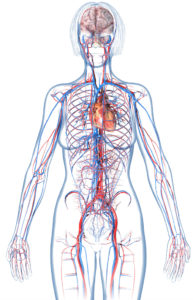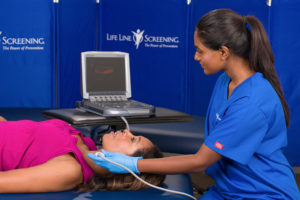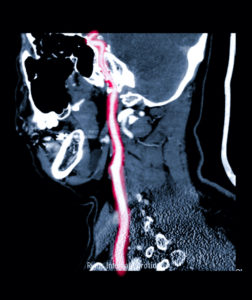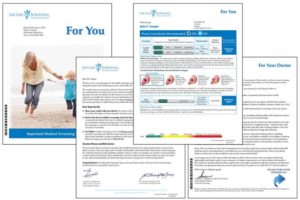Life Line Screening compensated FOF with an advertising sponsorship to write this post. Regardless, I started having its health screenings years before this, and I only recommend products or services that I believe will benefit others. Geri Brin, Founder, faboverfifty.com
Now more than ever, it’s critical to know your risk for Cardiovascular Disease
I’m concerned about being part of a high-risk group if I get the virus that’s turned our world upside down. And, at 73, my lungs and my heart could be even more vulnerable to harm if I had problems before COVID-19 became part of my vocabulary. While lung injury and respiratory problems took center stage as the most frightening complications of COVID-19, Cardiovascular Disease is another.
 Alarming facts: About 10 percent of patients with pre-existing Cardiovascular Disease who contract COVID-19 will die, compared with only 1 percent of patients who are otherwise healthy, according to an article in the health blog from Harvard Medical School.
Alarming facts: About 10 percent of patients with pre-existing Cardiovascular Disease who contract COVID-19 will die, compared with only 1 percent of patients who are otherwise healthy, according to an article in the health blog from Harvard Medical School.
Unfortunately, the absence of symptoms doesn’t mean you’re absolutely free of Cardiovascular Disease. This new viral infection, fever, and inflammation can destabilize heart vessel blockages you didn’t even know you had. This makes it imperative for anyone in the high-risk group to take ownership of your health and do everything you possibly can to avoid hospitalizations by eating right, exercising and getting screened for stroke and cardiovascular disease.
Even without the risks associated with COVID-19, cardiovascular disease is the leading cause of death for men and women in the United States. Now that you’re moving around a bit more freely, one of the first tasks on your agenda should be to understand your risk for cardiovascular disease.
Life Line Screening makes it easy by offering a special package of five preventative screening tests: 1) Atrial fibrillation or AFIB, a quivering or irregular heartbeat that can lead to blood clot, stroke, heart failure and other heart-related complications. 2) Peripheral arterial disease, a circulatory condition in which blood vessels narrowed by plaque reduce blood flow to the limbs. P.A.D. usually affects the arteries in the legs, but it also can affect the arteries  that carry blood from your heart to your head, arms, kidneys, and stomach. Peripheral artery disease may be an indication that plaque is also present in other areas of the body. 3) Plaque in the carotid arteries, which are the two large blood vessels on each side of the neck that supply oxygenated blood to the brain, neck and face. The carotid artery narrows and affects blood flow to the brain when it becomes clogged with plaque, and complications can be serious. If any of the plaque breaks off, it can block the blood flow to the brain completely, causing a stroke. Plaque in the arteries can develop over time without causing a singly symptom. 4) Abdominal aortic aneurysm, a bulging, weakened area in the wall of the aorta, which is the largest artery in the body. Over time, the blood vessel balloons and is at risk for bursting or tearing, which can cause life- threatening bleeding and potentially death. 5) Osteoporosis, a loss of bone density or mass.
that carry blood from your heart to your head, arms, kidneys, and stomach. Peripheral artery disease may be an indication that plaque is also present in other areas of the body. 3) Plaque in the carotid arteries, which are the two large blood vessels on each side of the neck that supply oxygenated blood to the brain, neck and face. The carotid artery narrows and affects blood flow to the brain when it becomes clogged with plaque, and complications can be serious. If any of the plaque breaks off, it can block the blood flow to the brain completely, causing a stroke. Plaque in the arteries can develop over time without causing a singly symptom. 4) Abdominal aortic aneurysm, a bulging, weakened area in the wall of the aorta, which is the largest artery in the body. Over time, the blood vessel balloons and is at risk for bursting or tearing, which can cause life- threatening bleeding and potentially death. 5) Osteoporosis, a loss of bone density or mass.
Life Line has provided preventive screening to millions for 25 years – and at remarkably fair fees – precisely what convinced me to first have its tests in 2010.
Life Line Warned Me. I Didn’t Listen
I wasn’t overly concerned when I learned my right carotid artery had mild fatty plaque since it wasn’t a dire threat to my health, at least not immediately. Uncharacteristically, I dismissed the report recommendation to follow up with my doctor, too preoccupied with launching this website at the time. I felt good and had no signs of a problem. My weight was reasonable. I exercised. Didn’t smoke or drink.
 My blasé attitude had troubling consequences.
My blasé attitude had troubling consequences.
By last year, my weight had spun out of control, I was working out less, and a new ultrasound showed a dramatic increase in the plaque. Now the bad stuff was narrowing the right carotid artery somewhere between 59 and 80 percent. That got my attention, even if there wasn’t a single symptom. If a piece of plaque broke off and blocked the blood flow, I could have a stroke. To make matters worse, my cholesterol numbers were dismal. My doctor started me on statin therapy right away to lower my cholesterol, told me to lose weight, start exercising again, and to take low-dose baby aspirin every day.
Ironically, most doctors won’t recommend screenings for carotid artery or peripheral arterial disease for asymptomatic patients with no family history of stroke or heart attack. What’s more, Medicare doesn’t cover the tests unless someone has experienced symptoms. Without coverage, it’s costly to have tests like this done at a hospital. The United States health system isn’t a shining example of how to practice preventive medicine.
Having no reason to suspect any cardiovascular problems a decade ago, I actually arranged for the first ultrasound through Life Line Screening as a preventive measure. When the original results showed mild plaque, it should have been fair warning not to let myself go. After all, that’s what preventive health care means. That’s what makes Life Line a smart idea.
The Life Line Screening Difference

When Life Line recently contacted me about introducing its screening service to my FOFriends, I didn’t hesitate. After all, they discovered the plaque in my carotid artery at an early stage, not to mention early bone loss, and suggested that I see my own doctor. Pretty foolish not to heed their advice. “Every day we find people across the country with significant carotid artery and cardiovascular disease,” said Dr. Keith Coffee, Chief Medical Officer at Life Line.
Only $159 For All Five Screenings
“We discovered about 62K overall health risks in 2017 alone,” Dr. Coffee said. A team of highly qualified, board-certified radiologists throughout the country, led by a vascular surgeon, reads all ultrasound images as well as the electrocardiograms for AFIB.
“These are screenings, not diagnostic tests,” Dr. Coffee stressed. “We encourage patients to share their results with their doctors so they can together discuss the appropriate treatment, if necessary.” (Remember, that’s what I didn’t do!) Life Line doesn’t have physicians available who can discuss the test results with patients, and it doesn’t interact with patients’ physicians. They do provide a summary of the results that you can share with your doctor. “We simply provide the incentive for patients to take the right steps for their health,” Dr. Coffee noted.
If Life Line Screening discovers a life threatening condition, however, such as an aneurysm that’s about to rupture, it will send someone right to the ER and call for an ambulance if they wish. “Our customers tell us that we’ve possibly saved their lives. We get letters all the time from people who had no symptoms and thought they were just fine, but were at risk for having a large aneurysm about the rupture,” Dr. Coffee said.
In and Out In 90 Minutes Or Less
Life Line serves 60 cities across the country each day. Teams at the screening sites include at least two ultrasound stenographers who hold certificates in ultrasound technology, and two medical assistants who are cross trained to perform tests including electrocardiograms for heart rhythm, fingerstick blood tests, and peripheral pulses. A nurse practitioner joins most of the teams to see people 65+ years old for Annual Wellness Visits, which are covered under Medicare.
While most people opt for the basic, five-test package I described earlier, many decide to get their cholesterol and glucose checked during the same appointment, Dr. Coffee told me. Life Line Screening offers 15 preventive screening blood tests, including thyroid function, vitamin D, and hemoglobin A1C for diabetes. It also provides a take-home test for detection of colorectal cancer. A call center with 300 trained employees helps participants decide what tests are right for them, based on their age, risk factors and medical history.
Testing is done in churches, at community centers, fraternal organizations and occasionally in hotel ballrooms. When Life Line works with affiliates, such as hospitals, anyone with abnormal results is referred back to the hospital. It also offers exclusive screenings for employees of large corporations as part of their healthcare plans. “Our goal is to get people in and out in 60 to 90 minutes, which includes paperwork and waiting time,” Dr. Coffee said.
The Results Are In
 A results package arrives in the mail about three weeks after your screening. It reports on every test you took and on your risk for stroke and cardiovascular disease in general, taking into account factors including smoking, high cholesterol and family history. “We give you all the information we can to help you make lifestyle changes and modifications if you need to,” Dr. Coffee explained. If a major issue such as AFIB is discovered, a Life Line representative will call you directly, rather than having you wait for the results package.
A results package arrives in the mail about three weeks after your screening. It reports on every test you took and on your risk for stroke and cardiovascular disease in general, taking into account factors including smoking, high cholesterol and family history. “We give you all the information we can to help you make lifestyle changes and modifications if you need to,” Dr. Coffee explained. If a major issue such as AFIB is discovered, a Life Line representative will call you directly, rather than having you wait for the results package.
People generally have their first Life Line screenings at 50 years old. “We have patients in their 40s who just want to know where they fit healthwise, or maybe they have a family history of early strokes. And, we have people in their 90s,” Dr. Coffee said. Returning patients account for about half of Life Line’s annual screenings, and close to 90 percent of all patients have their own physicians.
Get preventive screenings once you’re age fifty, whether or not you have symptoms. And pay attention to what you learn.



